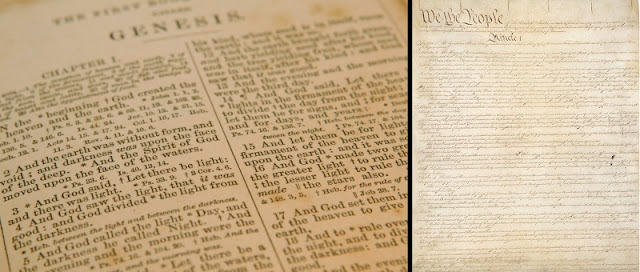When reading a document, it is important to understand the original intent of the authors. The goat rodeo hearings for the confirmation of Judge Brett Kavanaugh showed the lengths that some politicians will go to attain prominence for their own political viewpoints. Kavanaugh is an originalist, which means that he considers the original intent of the US Constitution when making his decisions. An interesting parallel can be made with interpreting the Bible.
It seems reasonable to determine the intent of the authors. Obviously, there are some marked differences because the Bible was written by several people under the guidance of the Holy Spirit, and the Constitution was written by fallible men with good intentions.
When the original meanings are abandoned, all sorts of bad judgments ensue. In the case of the Constitution, we had the Dred Scott decision and that unborn children are not legally protected as persons. When activist judges and other people believe that the Constitution is a living and evolving document, it can be made to say just about anything. Similarly, liberal religious leaders shy away from the original meaning of Scripture, torturing the text until it confesses to just about anything they desire.
The languages of both the Bible and the Constitution are important factors. The Constitution was ratified in 1788, so we have English language differences between then and now to consider. The Bible is much older and written in different languages, and the usage at the time is often a factor. For example, the word translated star (aster, ἀστήρ) has a broader meaning in the Bible than we use today.
Modern theologians bushwhack Genesis, conveniently ignoring the plain reading, valid exegesis, the historical-grammatical approach, and logical thinking so they can compromise with long ages and evolution. We also see the same violence applied to other passages in the Bible. A great deal of confusion and bad decisions could be avoided through commitment to the original intent.
 |
| Credits: Left image, Freeimages / Robert Owen-Wahl; Right image: US National Archives and Records Administration |
When the original meanings are abandoned, all sorts of bad judgments ensue. In the case of the Constitution, we had the Dred Scott decision and that unborn children are not legally protected as persons. When activist judges and other people believe that the Constitution is a living and evolving document, it can be made to say just about anything. Similarly, liberal religious leaders shy away from the original meaning of Scripture, torturing the text until it confesses to just about anything they desire.
The languages of both the Bible and the Constitution are important factors. The Constitution was ratified in 1788, so we have English language differences between then and now to consider. The Bible is much older and written in different languages, and the usage at the time is often a factor. For example, the word translated star (aster, ἀστήρ) has a broader meaning in the Bible than we use today.
Modern theologians bushwhack Genesis, conveniently ignoring the plain reading, valid exegesis, the historical-grammatical approach, and logical thinking so they can compromise with long ages and evolution. We also see the same violence applied to other passages in the Bible. A great deal of confusion and bad decisions could be avoided through commitment to the original intent.
To read the article in its entirety, click on "Scriptural originalism — Searching for the meaning of Scripture". Also, you may be interested in a podcast or transcript by Dr. Albert Mohler. Follow this link and look for "As both sides attempt to read the tea leaves on abortion, the legitimacy of the Supreme Court is called into question".In the recent Supreme Court nomination furor, Evangelicals were often named by the media as supporters of the originalist nominee. The reason for this is obvious as to hold on to biblical mores and values, a fidelity to the culturally Christian context within which the constitution was framed is essential. It is therefore a bitter irony that many of these same evangelicals do not take an originalist position on our own ‘founding document’ as Christians, the Bible—particularly the ‘preamble’ to the Bible, the opening chapters of Genesis. Many (in fact most) evangelical leaders today have abandoned the fundamental principle of a historical-grammatical approach to their interpretation of the scriptures when it comes to origins. This approach basically entails the idea that the original meaning of the words and the intentions of the authors are essential in rightly understanding and interpreting the Bible. The scriptures are divinely inspired and therefore stand on their own authority.There can be no doubt as to the intent of the original writers of Genesis. In a well-known quote the Oxford Hebrew scholar James Barr, himself hostile to the Genesis account of creation a few thousand years ago, nevertheless asserts,
